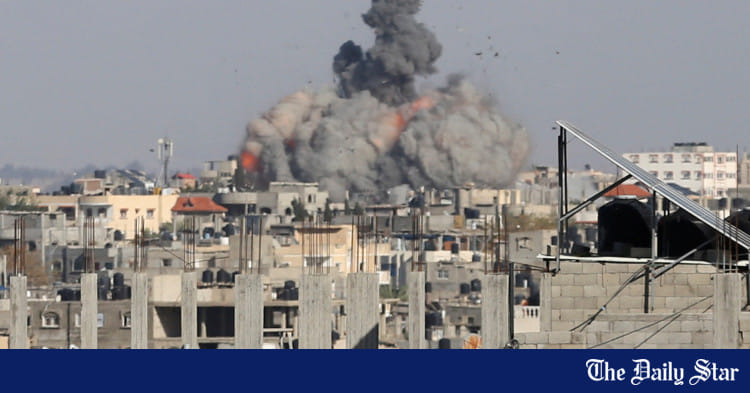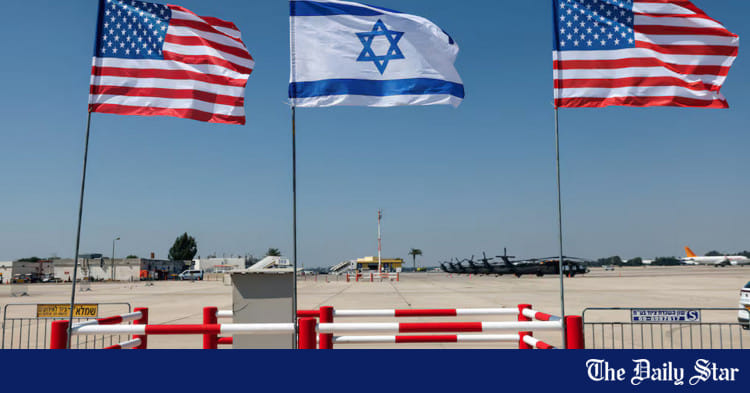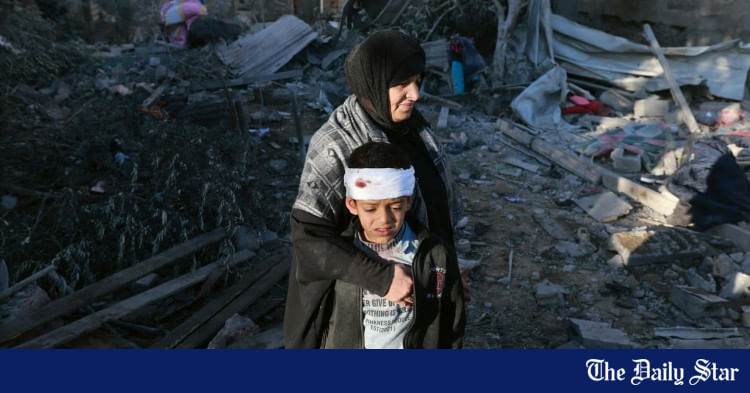Saif
Senior Member
- Messages
- 17,408
- Likes
- 8,373
- Nation

- Residence

- Axis Group


Hezbollah launches rockets at Israel
A local official and state media in Lebanon said an Israeli strike on a southern village on Sunday killed several people from the same family, with Hezbollah...
 www.newagebd.net
www.newagebd.net
Hezbollah launches rockets at Israel
Agence France-Presse . Beirut 05 May, 2024, 22:48

This picture taken from the northern Israeli kibbutz of Malkia along the border with southern Lebanon, shows smoke billowing above the Lebanese village of Mays al-Jabal during Israeli bombardment on Sunday, amid on-going cross-border tensions as fighting continues between Israel and Palestinian Hamas in the Gaza Strip. | AFP photo
A local official and state media in Lebanon said an Israeli strike on a southern village on Sunday killed several people from the same family, with Hezbollah announcing rocket fire in retaliation.
Israel and Lebanon's Iran-backed Hezbollah group have exchanged regular cross-border fire since Palestinian militant group Hamas's unprecedented October attack on southern Israel sparked the war in Gaza.
Fighting has intensified in recent weeks, with Israel striking deeper into Lebanese territory, while Hezbollah has stepped up its missile and drone attacks on military positions in northern Israel.
Lebanon's state-run National News Agency said the strike in Mais al-Jabal killed 'four people from a single family', updating an earlier reported toll of three dead in the raid it said was carried out by Israeli aircraft.
It identified them as a man, a woman and their children aged 12 and 21, and said two other people were wounded.
A Lebanese security source confirmed the strike killed 'four civilians'.
Mais al-Jabal municipality chief Abdelmoneim Shukair had earlier said that three people were killed, saying they were a couple and their son.
Hezbollah in a statement said it fired 'dozens of Katyusha and Falaq rockets' at Kiryat Shmona in northern Israel 'in response to the horrific crime that the Israeli enemy committed in Mais al-Jabal'.
The Lebanese movement has repeatedly declared that only a ceasefire in Gaza will put an end to its attacks on Israel, which it says are in support of Gazans and its ally Hamas.
Both the United States and France have made diplomatic efforts to calm tensions on the Lebanese-Israeli border.
In Lebanon, at least 390 people have been killed in nearly seven months of cross-border violence, mostly militants but also more than 70 civilians, according to an AFP tally.
Israel says 11 soldiers and nine civilians have been killed on its side of the border.
Tens of thousands of people have been displaced on both sides.
Agence France-Presse . Beirut 05 May, 2024, 22:48
This picture taken from the northern Israeli kibbutz of Malkia along the border with southern Lebanon, shows smoke billowing above the Lebanese village of Mays al-Jabal during Israeli bombardment on Sunday, amid on-going cross-border tensions as fighting continues between Israel and Palestinian Hamas in the Gaza Strip. | AFP photo
A local official and state media in Lebanon said an Israeli strike on a southern village on Sunday killed several people from the same family, with Hezbollah announcing rocket fire in retaliation.
Israel and Lebanon's Iran-backed Hezbollah group have exchanged regular cross-border fire since Palestinian militant group Hamas's unprecedented October attack on southern Israel sparked the war in Gaza.
Fighting has intensified in recent weeks, with Israel striking deeper into Lebanese territory, while Hezbollah has stepped up its missile and drone attacks on military positions in northern Israel.
Lebanon's state-run National News Agency said the strike in Mais al-Jabal killed 'four people from a single family', updating an earlier reported toll of three dead in the raid it said was carried out by Israeli aircraft.
It identified them as a man, a woman and their children aged 12 and 21, and said two other people were wounded.
A Lebanese security source confirmed the strike killed 'four civilians'.
Mais al-Jabal municipality chief Abdelmoneim Shukair had earlier said that three people were killed, saying they were a couple and their son.
Hezbollah in a statement said it fired 'dozens of Katyusha and Falaq rockets' at Kiryat Shmona in northern Israel 'in response to the horrific crime that the Israeli enemy committed in Mais al-Jabal'.
The Lebanese movement has repeatedly declared that only a ceasefire in Gaza will put an end to its attacks on Israel, which it says are in support of Gazans and its ally Hamas.
Both the United States and France have made diplomatic efforts to calm tensions on the Lebanese-Israeli border.
In Lebanon, at least 390 people have been killed in nearly seven months of cross-border violence, mostly militants but also more than 70 civilians, according to an AFP tally.
Israel says 11 soldiers and nine civilians have been killed on its side of the border.
Tens of thousands of people have been displaced on both sides.






